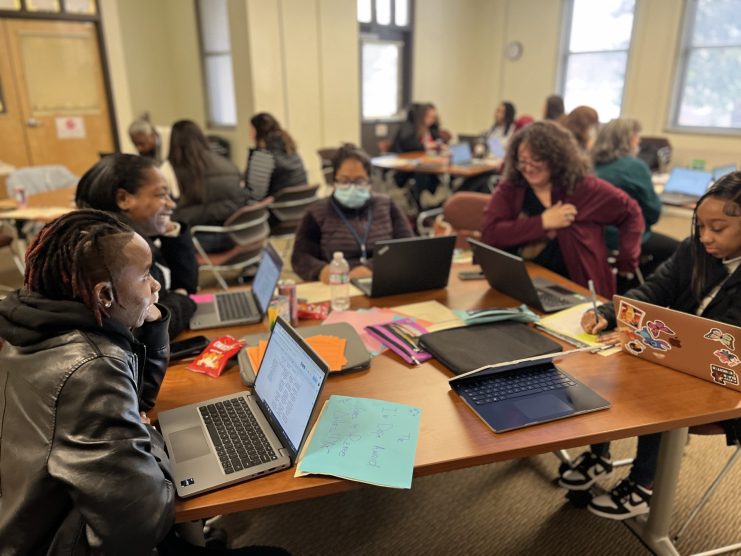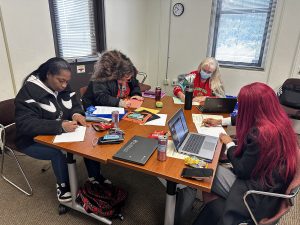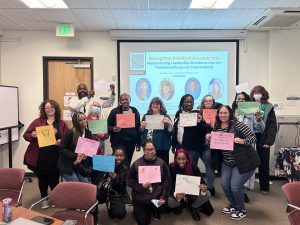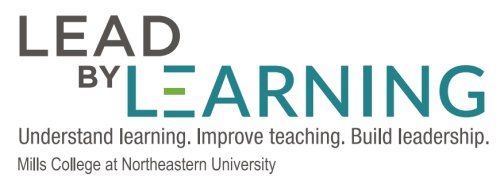
Collaboration Brings Authentic Learning to Quality Program Improvement
As Vallejo City Unified School District Site Coordinators entered their monthly professional development with Lead by Learning the room was immediately abuzz with conversations about their sites.
Since 2021, Lead by Learning has been a partner of Vallejo City Unified School District’s Expanded Learning department to create the conditions for Expanded Learning staff to engage in the program improvement process more authentically through ongoing data collection, reflection, and collaboration.
Bringing Quality Program Improvement to Life with Data
Before the partnership, the program improvement process often felt like “one big checklist” shared District Coordinator Carol Lewis. In place in case a state auditor asked for the paperwork, the process was riddled with compliance. To support Vallejo City Unified to move from compliance to curiosity, Lead by Learning began by assessing what was in place already to build upon and what new strategies, routines, and practices could be instrumental to transforming the process for the staff and ultimately their students.
Through many conversations with the design team, Lead by Learning’s practice to distribute leadership through adult learning design, the Vallejo City Unified Team decided to create a tool for knowledge management where Site Coordinators could reflect monthly and use it to store and organize data. As a running record, both the data and the Site Coordinator’s thinking about their data are made visible and it embeds the idea of recording thinking and progress throughout the year.
“It helps me to look back at what I have actually said,” said Jaynell Boykin, Site Coordinator at Mare Island Health and Fitness Academy, “ I have learned that collecting data is not as hard as I thought it would be.”
Not only have Site Coordinators become less intimidated by data, but they have expanded their definitions of data to move beyond surveys to focus on the “on-the-ground” information they are receiving daily from students.

Expanded Learning Site Coordinators and Assistant Managers reflect on the data they brought to discuss as Public Learners.
“Data has opened them up to talk to students more and connect with students in a different way. We thought data had to be numbers, but student engagement is also what you see and what you observe when you do walk and talks,” shared Expanded Learning Assistant Manager Renee Collins.
A shift has been seen in both practice and mindset as coordinators recognize and celebrate the data they are collecting all the time, even when they didn’t originally know it. Now, shares Lewis, “our culture is one of improving and reflecting on the process,” and because her team is recording their thinking they are meeting the compliance needs authentically.
Community of Practice: A designated space for reflection and collaboration
Holding the belief that everyone in the room wants the best program possible for their students, is at the center of each collaboration meeting. Using their data and reflections as a springboard, Site Coordinators collaborate as Public Learners to share ideas and break down the silos that often exist in Expanded Learning. Coming from 16 sites across the district, Site Coordinator collaboration can be challenging because of the geographical distance between their work.
Each month when Site Coordinators convene, they are provided a designated space to return to their data together. Lewis has seen how the idea of reflecting on one’s process is now part of her Site Coordinator’s mindset and they push each other to deepen their reflections. The time to share as Public Learners is a favorite part of the inquiry community of practice sessions with Lead by Learning. Site Coordinators shared:
- “It gives us the opportunity to see what is happening at another site and have ideas about how other sites solve the same problems we are having.”
- “I also love the sharing aspect of us being able to be together to share each others stories, successes, next steps, and our struggles. It makes us more of a team in understanding everyone else’s position individually and collectively. This is what makes us the Expanded Learning Program.”
- “It was nice to collaborate and hear other ideas that you might not come up with on your own or validation of what you thought”
- “It feels that we are moving in a positive direction and allowing each other to improve without judgement. This is the type of process that builds community.”
Collaboration in Action
In December, Site Coordinators had an opportunity to return to the goals they had written the month before refining them further. In small groups, each coordinator had an opportunity to be the Public Learner to expand their ideas, become clearer on the data they would collect to understand impact and name their next steps.
Renee: Your goal is by May 2024, 7th-grade students will learn how to respect all staff members when I switch staff a few days a week using panorama and one-to-one conversations. You are looking to improve student-to-staff relationships. How do you feel about your goal?
Jaynell: Still feel good because what’s currently happening is when I switch some of the staff around for middle school students, students are not as receptive to playing the games that the new staff choose, they only want to play with the staff they know. They say, “Can I come with you?” They don’t want to be with other staff. They aren’t building relationships. It is both the student and staff not building the relationship.
R: Is there something the middle school staff is doing that these other staff can learn from?
J: He is talking to them more during homework time, versus they are talking to the younger kids. They haven’t built a relationship. Staff tell them to move and students say, “I’m not moving.”
R: What do you want to see happen?
J: I want to see all the students respecting all staff whether they like them or not, if they tell them to do it, they need to do it. You are going to get up and move.
R: What do you want to see in the adults?
J: I want them to engage more and make them see that students can come to them. And adults are more receptive to how students are feeling whether they are good or bad.
R: What does respect look like to you?
J: Not having to ask more than once, and not having to come to me with a situation. Right now I have to step in.
R: What action steps would you like to take to tackle this goal?
J: I implemented the community circles, where the staff go to different grades and talk to them to build relationships they don’t usually have. In the community circle, they are more open to sharing how they feel.
R: In the community circle how will you tackle the topic of respecting the staff?
J: I think the staff can bring up different topics to get to know them and to talk about respect and engage certain questions to be able to see.
R: Any other action you want to take? What are your next steps to help the students or staff as a coordinator, what’s your role in it?
J: I think I need to step back. When I see students being disrespectful it bothers me, students would never do that to me. I need to back up to coach my staff and not answer the questions for them and allow them to solve it.
R: Do you have time to sit down and talk to the staff and debrief what you are seeing?
J: I have not done that in a while. Should I have a one-on-one with each staff member or big group talk?
R: How do you feel? What would be necessary to get better results?
J: Maybe 1:1?
R: As coordinators, we all know time is really limited, can we think of a strategy for you to set a good time aside for the both of you?
Renee’s support of Jaynell didn’t end there, but Jaynell’s vulnerability as a Public Learner and Renee’s deep listening to support her thinking helped reveal to Jaynell what success would look like and the next steps she could take both with her staff and her students.
Continuous Quality Improvement
As Vallejo City Unified Site Coordinators dive into the second half of the year together, they are moving forward with intentionality and a deep commitment to always be engaging in the quality improvement cycle. Together as a team they are navigating challenges, and supporting their own growth and the growth of each other, as well as the development of their programs for students.
Recently, Lewis was featured on Lead by Learning’s webinar Strengthen Distributive Leadership. During the webinar, she shared, “One of the most joyful things I’ve had in this career is watching my staff grow as leaders because that’s the purpose… my purpose is not to do the work and dictate to them what to do but to strengthen their natural abilities to lead the work, look at their data and respond to what they see on the ground.”

Vallejo City Unified Site Coordinators, Assistant Managers, and District Coordinator smile for a group photo with the awards they gave themselves as part of a Warm Welcome activity in December to honor their unique strengths and the assets they bring to their district, sites, and team.
Lead by Learning is honored to be a partner of Vallejo City Unified Expanded Learning. Interested in learning more about how Lead by Learning supports Expanded Learning District Teams and Site Coordinators, reach out to Senior Director Sugar Sugarman at s.sugarman@northeastern.edu. Read more about Public Learning and creating the conditions for learning in our Lead by Learning playbook.
